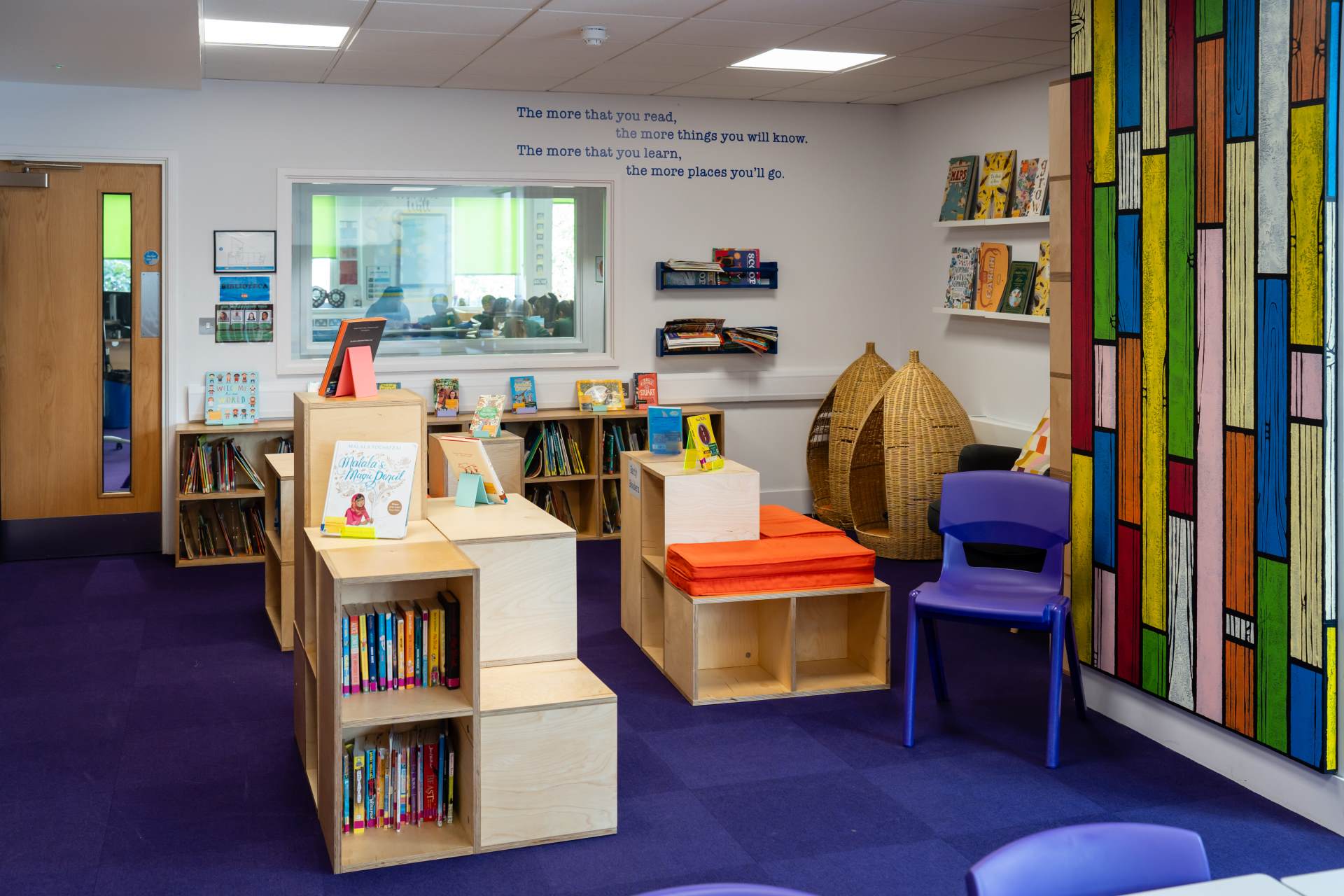English
Reading: Early Years and Year 1 - Phonics
Reading is top priority from the very start of children's school journey, and is heavily promoted with all families from the beginning. Pupils begin to learn to read on their very first day by listening to stories, rhymes and songs. Adults read to the children very regularly and are keen to make sure that all children learn to read by themselves as soon as possible.
We use Read, Write Inc. as our learn to read programme, and have seen excellent developments with children’s reading and writing skills. It is a phonics-based approach to literacy teaching, and all lessons involve reading and writing activities. Read, Write Inc. teaching begins formally in Reception, with the aim that most children complete the programme by the Autumn term of Year 2.
Expectations and standards are high as we aim for all our children to become fluent, confident and passionate life-long readers. Read, Write Inc. programmes are carefully managed by the Reading Leader with lively, engaging and inspiring lessons. Staff have high expectations of the sounds and the words that children learn; pupils learn to read by learning synthetic phonics and high frequency and common exception words.
Children enjoy their lessons immensely, rapidly learning our very complex alphabetic code, which they apply to both reading and writing. We use a range of high quality storybooks to make explicit links to the Read, Write Inc. text children are studying during lessons.
From the very beginning of the programme, children’s writing skills are developed through phonetic knowledge. In Reception, pupils start by practising forming written sounds (graphemes) and short, phonetically regular (green) words. Children soon move onto writing short, coherent sentences and later, descriptive, imaginative compositional pieces of writing.
Partner practice is embedded in every stage of the teaching cycle, ensuring children are given lots of opportunities to formulate and discuss their ideas, develop their comprehension and make links to their own experiences.
Lots of concrete experiences are provided during the teaching cycle to further support children’s writing, and the use of Read Write Inc. teaching strategies throughout the day reinforces children’s confidence in and enjoyment of literacy across the curriculum.
Read Write Inc. parents booklet
When children have completed the Read, Write Inc. phonics programme they move on to a Reading Scheme called Master Readers.
Reading: Year 2 through to Year 6
Pupils in Year 2 through to Year 6 have a dedicated half hour of guided reading each day. Guided Reading books have been chosen to complement the topics pupils are studying within foundation subjects and may also link to the genre pupils are learning about in English lessons. To further develop a love of reading, teachers read to their classes at the end of most days for 10 minutes.
Excellence after phonics
Once pupils learn the mechanics of reading through a phonics programme, developing their comprehension skills becomes the primary focus in teaching reading. The skills and knowledge pupils need in order to comprehend are very similar at different ages. Therefore, we follow a ‘Master Readers’ approach to teaching reading from Year 2 (when RWI programme is complete) through to Year 6.
The weekly cycle supports pupils in developing their reading ability across the week. Pupils have a 30-minute lesson to give them a daily opportunity to become true readers.
Our reading strategies are taken from the National Curriculum. We ensure that children have been taught to predict, retrieve, infer, and deepen their vocabulary. Children at Halley become active readers and are able to apply the four reading strategies in their own reading. The children also develop their speaking and listening skills which are crucial for critical thinking.
Writing
We aim for our writers to be confident in communicating their ideas and thoughts, drawing on their broad knowledge and quality experiences. Children are encouraged to take pride in their writing, develop the ability to write and speak clearly and to select vocabulary to suit a range of audiences and purposes.
Our children become fluent, confident writers by exploring high-quality texts that emphasise language and structure before creating their own pieces. Pupils learn to write for a variety of purposes and become familiar with different text types.
Our writing curriculum connects closely with other subjects, enabling children to write effectively for diverse audiences and apply a broad range of vocabulary and knowledge. We strengthen pupils’ grammar skills through dedicated lessons and by embedding grammar practice throughout the English curriculum and beyond.
Spelling
We use the Read, Write Inc. spelling programme to teach spelling from Years 2-6. This is an interactive and engaging programme which teaches children the rules and patterns of spelling; there is also a focus on irregular spelling patterns which need to be memorised.
Memorising spelling for a weekly spelling test can be stressful, and often children are unable to apply accurate spelling of these words to their writing. Because spelling is taught and rehearsed daily, children will not be given lists of spellings to learn for a test.
How can I support my child?
- Creative writing (writing short stories)
- Using opportunities to write about shared experiences (diary or letter writing)
- Writing shopping lists
- Practising writing their name
- Opportunities for drama and role play
- Opportunities to develop speaking and listening skills (having quality discussions).











